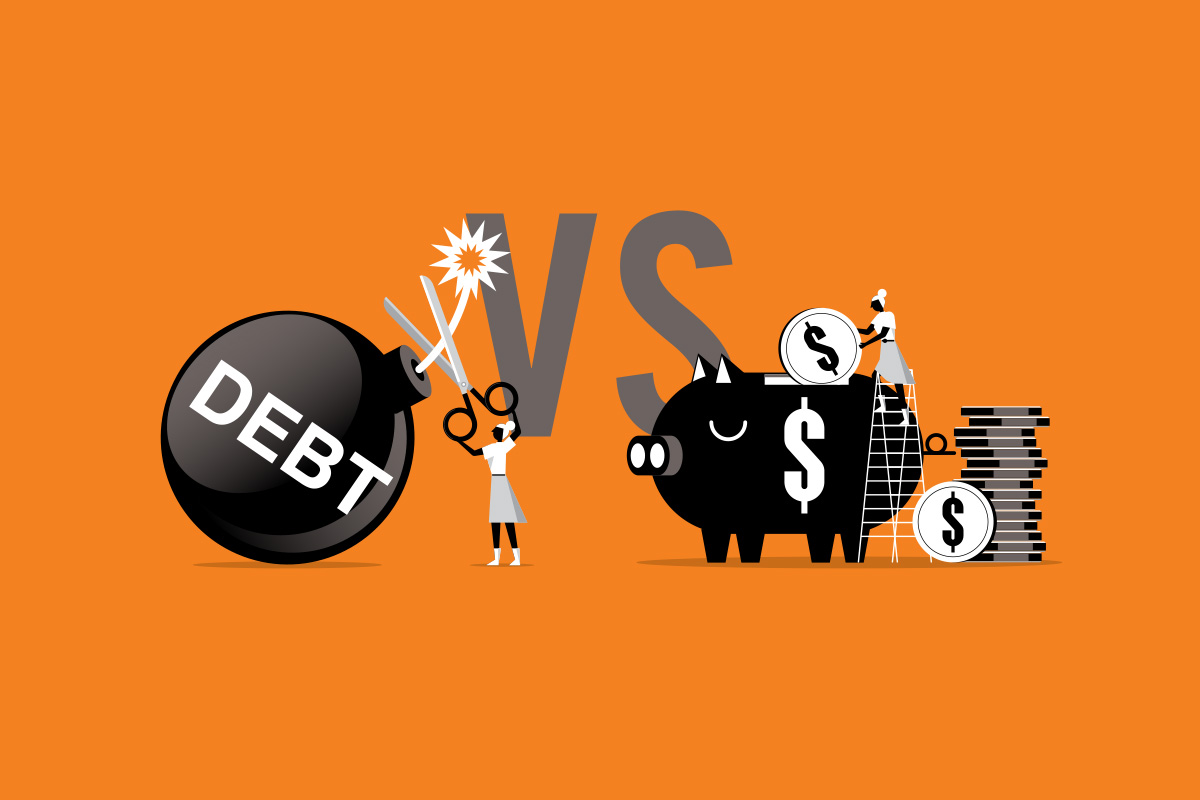
Key Takeaways:
“Should we pay off the mortgage quicker or keep the money invested?”
“Should I pay off my credit card balance now instead of saving for retirement?”
Pay down debt or save? This question comes up many times during our conversations with clients. You can use a variety of strategies to pay off debt, many of which can cut not only the amount of time it will take to pay off the debt but also the total interest paid. But like many people, you may be torn between paying off debt and the need to save for retirement or other goals. Both are important; both can help give you a more confident future. If you’re not sure you can afford to tackle both at the same time, which should you choose? There’s no one answer that’s right for everyone, but here are some of the factors you should consider when making your decision.
Rate of Investment Return Versus Interest Rate on Debt
Probably the most common way to decide whether to pay off debt or to make investments is to consider whether you could earn a higher after-tax rate of return by investing than the after-tax interest rate you pay on the debt. For example, say you have a credit card with a $10,000 balance on which you pay nondeductible interest of 18%. By getting rid of those interest payments, you’re effectively getting an 18% return on your money. That means your money would generally need to earn an after-tax return greater than 18% to make investing a smarter choice than paying off debt. That’s a pretty tough challenge even for professional investors. And bear in mind that investment returns are anything but guaranteed. In general, the higher the rate of return, the greater the risk. If you make investments rather than pay off debt and your investments incur losses, you may still have debts to pay, but you won’t have missed the benefit of any gains. By contrast, the return that comes from eliminating high-interest-rate debt is a sure thing.
An Employer’s Match May Change The Equation
If your employer matches a portion of your workplace retirement account contributions, that can make the debt versus savings decision more difficult. Let’s say your company matches 50% of your contributions up to 6% of your salary. That means that you’re earning a 50% return on that portion of your retirement account contributions. If surpassing an 18% return from paying off debt is a challenge, getting a 50% return on your money simply through investing is even tougher. The old saying about a bird in the hand being worth two in the bush applies here. Assuming you conform to your plan’s requirements and your company meets its plan obligations, you know in advance what your return from the match will be. Very few investments can offer the same degree of certainty. That’s why many financial professionals argue that saving at least enough to get any employer match for your contributions may make more sense than focusing on debt. And don’t forget the tax benefits of contributions to a workplace savings plan. By contributing pretax dollars to your plan account, you’re deferring anywhere from 10% to 39.6% in taxes, depending on your federal tax rate. You’re able to put money that would ordinarily go toward taxes to work immediately.
Your Choice Doesn’t Have To Be All Or Nothing
The decision about whether to save for retirement or pay off debt can sometimes be affected by the type of debt you have. For example, if you itemize deductions, the interest you pay on a mortgage is generally deductible on your federal tax return. Let’s say you’re paying 6% on your mortgage and 18% on your credit card debt, and your employer matches 50% of your retirement account contributions. You might consider directing some of your available resources to paying off the credit card debt and some toward your retirement account in order to get the full company match, and continuing to pay the tax-deductible mortgage interest. There’s another good reason to explore ways to address both goals. Time is your best ally when saving for retirement. If you say to yourself, “I’ll wait to start saving until my debts are completely paid off,” you run the risk that you’ll never get to that point because your good intentions about paying off your debt may falter along the way. Putting off saving also reduces the number of years you have left to save for retirement.
Closing Thoughts
Ultimately, as with nearly everything in personalized financial planning, there is no blanket recommendation that applies to everyone when it comes to paying off debt or saving. It depends on your goals, desires, and current financial and life situation. Our team is always here and eager to discuss these tough financial life questions.
This material is not financial advice or an offer to sell any product and is not a recommendation to buy or sell any particular security. The opinions expressed are those of the Saling Wealth Advisors’ Management Investment Team and are subject to change without notice.
Saling Wealth Advisors (“SWA”) is an independent SEC registered investment advisor. Registration does not imply a certain level of skill or training. This material is provided for informational and educational purposes only. More information about SWA including our advisory services, fees, and objectives can be found in our Form ADV Part 2A, which is available upon request.




